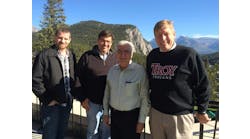Terry Molloy, former Executive Board member, writes:
What do I want to be when I grow up?
Everyone has ideas and since most of our group are bright people they are
typically good ideas. Jim Pinto and Walt Boyes make a good point about
going international in the right way as well as their observation about the
demonstrated lack of interest in North America. However, I think Diana is
closer to the heart of the problem. We have lost some great leaders during
the last several years and those that remain are indeed just warming their
chairs waiting for something good to happen. "That ain't happen folks" and
the reason is clear; the ISA staff want to keep their jobs and many of the
Executive Board are salespersons by training. The user community is almost
extinct as far as representation at the higher levels of ISA leadership, so
what do we have to look forward to from ISA?
When I was on the Executive Board I suggested that we look to Rotary as a
model for being organized on both a national and an international level.
That suggestion was totally ignored.
On Tuesday I attended a Rotary meeting where I heard Dr. Peter Bretan speak
about his recent trip to the Philippines and the kidney transplants he and
his all-volunteer team performed. Peter's credentials and his
accomplishments are remarkable, but even more remarkable are his commitment
to his profession and the desire to make this world a better place to live.
Peter started by telling us about how his father almost died when he (Peter)
was ten years old, but was saved by a surgeon. Peter said that he would
never forget seeing the doctor walking toward him down the hall with a smile
on his face. The doctor grabbed Peter's arm and put his other hand on
Peter's shoulder and said, "Your dad's going to be alright; we used a new
procedure." The doctor then turned and walked away. Peter said that he
knew then that his goal in life was going to be to make others feel the way
he felt at that moment.
Rotary attracts people like Peter because the volunteer leadership and
Rotary staff keep their eye on the ball - "Service Above Self."
ISA only deals with "one" profession where Rotary deals with multiple
professions and perhaps that is the Rotary advantage. But I think it is
more about facilitating the opportunities for our volunteers to serve our
industry and improve the application of the technology. I thought that was
the ISA mission.
ISA currently focuses too much on making money to support its staff and
expensive management team and almost nothing on supporting local member
needs. Every new "program" ISA presents is designed to make money to
support the staff that implements it. Unfortunately this staff needs to
make a living and thus these programs are offered at "market rate." I am
not going to donate my time, energy, and knowledge to a business that
charges my fellow professionals "market rate" for that effort. Why not just
provide the services myself at a more competitive rate without all the
overhead?
The deal breaker for many of us was the "Standard's Subscription." The
original objective was to make ALL ISA Standards available to ISA members
for free if the standard could be downloaded via the Internet. The
Executive Board agreed to a $25 annual charge because ISA Staff said that
was the only way they could track who was using the service. We all now
know where that service is at today. We might also take a moment to reflect
on how active the promoters of the original ISA Free Standards concept are
today in ISA.
In closing I leave you with this thought: Do we want ISA to become a "for
profit business" or do we want to continue as a not for profit professional
technical society? The "for profit business option" could change our tax
status and the size of our war chest if the Council of Society Delegates
were to approve it; something I cannot see happening. So, maybe we should
focus on selling off or otherwise "dumping" the businesses that require the
expensive staff and management teams (We could move them to ISASI). Then
move toward facilitating motivated members (I am sure we have many potential
Peter Bretan's in our profession they are just not currently active
members.) to fulfill the ISA mission.
Have a great week!
Terry V. Molloy, P.E.
Latest from Home
Latest from Home
Leaders relevant to this article:



